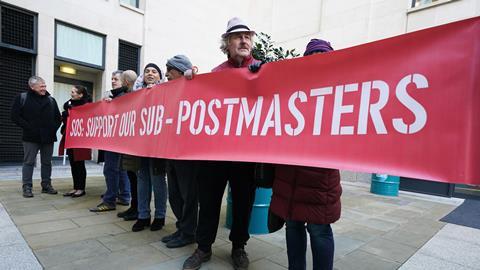Phase four of the Post Office Horizon IT Inquiry is turning its attention to the role of lawyers in civil and criminal proceedings, investigations and disclosure. This could be a seminal moment
One of the curiosities of the Post Office Horizon scandal has been the absence of lawyers from much of the coverage.
More than 700 people working for the Post Office were wrongly convicted of stealing money from their employer based on data from the now-discredited Horizon IT system brought into branches around the turn of the century.
The scandal has rightly been described as one of the most widespread miscarriages of justice in British history. But commentary on the role of lawyers has been limited, despite legal professionals clearly being front and centre. Even the statutory inquiry is called the Post Office Horizon IT Inquiry, as if the problems started and ended with faulty technology.
As Timothy Brentnall, convicted of false accounting and sentenced to a suspended prison sentence (a conviction overturned in 2021), told the inquiry in March: ‘It’s fair to say that [Horizon is] the root cause and that problems started with Horizon, but we’re here discussing the human impact and I think the inquiry should also be looking at the human cause of these problems.
‘It wasn’t Horizon that prosecuted us. It was the Post Office. It wasn’t Horizon that encouraged us to pay back money under threat of theft charges. That was people at the Post Office.’
The question for the inquiry – and perhaps for legal services regulators – is to what extent lawyers are implicated. Were they bystanders to the relentless prosecution of innocent people, or, as some have alleged, were they enablers, attack dogs and allies of those who must have known the Horizon system was untrustworthy and yet did nothing to stop this tragedy?
This month we may start to find out. Phase four of the inquiry is examining the action against subpostmasters: policymaking, audits and investigations, civil and criminal proceedings and knowledge of and responsibility for failures in investigation and disclosure.
'One of our most serious miscarriages of justice cases may well be about to lead to the most serious professional misconduct scandal of our lifetimes'
Professor Richard Moorhead, Exeter Law School
The stakes are potentially enormous, says legal ethics professor Richard Moorhead of Exeter University, who has written extensively about the scandal.
‘One of our most serious miscarriages of justice cases may well be about to lead to the most serious professional misconduct scandal of our lifetimes,’ he said. ‘The scandal involves many lawyers, sometimes in ways that might be merely embarrassing, sometimes in ways that implicate ethics in the broader sense or sometimes in ways that may mean professional misconduct. And sometimes perhaps for one or two, there may be questions about breaches of criminal law.’
Several of those convicted attend the inquiry on a daily basis. One told the Gazette during a break in proceedings she was still tortured by what happened but had to be present to witness senior Post Office bosses being held accountable.
She was there on Tuesday this week for the oral evidence of Ben Foat, group general counsel of Post Office Limited. He was not listed as a witness to this stage (he joined the company only in 2015) but was summoned to explain why a key document had only been disclosed as part of a freedom of information request in April this year, when the inquiry had specifically asked a year earlier for all documents relevant to the prosecution. The document in question was a series of identification codes with racist and offensive terms for suspects, which was emailed internally as an attachment 23 times between 2012 and 2019.
In what has become a familiar scenario for victims, Foat was apologetic but did not name anyone responsible. The e-disclosure system used to comb through millions of documents searching for key words was blamed, as Foat explained it had been a failure of the ‘de-duplication’ process. He agreed the process had been too ‘mechanical’ and revealed that between four and eight in-house Post Office lawyers, as well as 46 from Herbert Smith Freehills and five from Peters & Peters, are now working on disclosure and remediation issues.
Foat said: ‘The Post Office is absolutely committed to making sure there is full disclosure. Genuinely, everyone in the teams is working in different law firms incredibly hard. I recognise there are a number of areas where we have fallen short and I do apologise to the inquiry.’
As one attendee noted later, it was ironic that the Post Office still relied so heavily on technology, given what caused this lamentable scandal in the first place.
Foat will not be the last lawyer to address this inquiry and the victims of the scandal sitting in its front row. Witnesses – and the profession as a whole – have some very tough questions to answer.
This article is now closed for comment.





































8 Readers' comments